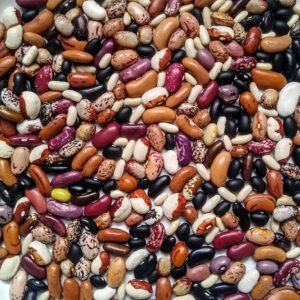
 Last Saturday, OSA teamed up with the Family Farmers Seed Cooperative and Prairie Road Organic Farm to teach a course on the Fundamentals of Organic Seed Production and Variety Improvement in Fullerton, North Dakota. I led a classroom session in the morning and then participants attended a field session in the afternoon at Prairie Road Organic Farm.
Last Saturday, OSA teamed up with the Family Farmers Seed Cooperative and Prairie Road Organic Farm to teach a course on the Fundamentals of Organic Seed Production and Variety Improvement in Fullerton, North Dakota. I led a classroom session in the morning and then participants attended a field session in the afternoon at Prairie Road Organic Farm.
Fall was setting in as we walked through the fields of Prairie Road Organic Farm, with rain and wind threatening. We learned that Prairie Road is a family farm run by the Podolls – David and Ginger, and Theresa and Dan. Certified organic for over 30 years, it stands as an oasis in the midst of large-scale conventional corn and beans. We were able to see the diversity of vegetable seed crops that the Podolls produce, including watermelon, onions, winter squash, pop corn, and tomatoes.
Touring Prairie Road provided an excellent opportunity to see the kind of innovation that many organic seed growers display. Almost every variety grown by the Podolls was something that had been bred on the farm to thrive in their climate and their organic production system. This included the ‘Dakota Rose’ watermelon, ‘Uncle David’s Dakota Dessert’ squash, ‘Dakota Black’ popcorn, ‘Dakota Tears’ onion, and the ‘Dakota Sport’ tomato. The Podolls had invented new harvest methods, like using a shop vac to harvest watermelon seed. And they are innovating on the marketing front as founding members of the Family Farmers Seed Cooperative, a producer owned organic seed marketing coop.
At the end of the day, the dozen or so participants closed the doors of their cars and pointed their wheels toward the darkening sky. But before they did so, they stopped to thank OSA and the Podolls for the lessons they learned. Everyone was grateful to get the basic tools and the confidence to begin to adapt their own varieties to their own farms, just as the Podolls have been doing for over 30 years.
